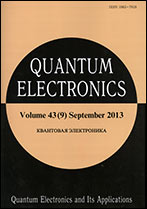|
Nonlinear optical processes and devices
Coherent shock-wave spectroscopy
V. N. Zadkov, P. V. Kozlov, S. A. Losev, V. A. Pavlov
Abstract:
The method of coherent anti-Stokes Raman scattering (CARS) was used in shock-wave diagnostics. CARS spectra were obtained, for the first time, for nitrogen heated in the equilibrium zone of a shock wave in the temperature range 1.6–3.2 kK. The experimental data were analyzed using a model which took into account collisional transfer in the Q band of N2 and the effects of two-photon Raman saturation.
Received: 05.11.1986
Citation:
V. N. Zadkov, P. V. Kozlov, S. A. Losev, V. A. Pavlov, “Coherent shock-wave spectroscopy”, Kvantovaya Elektronika, 15:1 (1988), 118–126 [Sov J Quantum Electron, 18:1 (1988), 77–81]
Linking options:
https://www.mathnet.ru/eng/qe10590 https://www.mathnet.ru/eng/qe/v15/i1/p118
|


| Statistics & downloads: |
| Abstract page: | 192 | | Full-text PDF : | 71 | | First page: | 1 |
|





 Contact us:
Contact us: Terms of Use
Terms of Use
 Registration to the website
Registration to the website Logotypes
Logotypes








